If you’re searching for the 15 best connected ECG devices that offer reliable, hospital-grade heart monitoring, you’re in the right place. I recommend options like KardiaMobile models and EMAY for their accuracy, portability, and easy data sharing via smartphones. These devices are user-friendly and suitable for quick on-the-spot assessments. Keep exploring further to discover which features and models best fit your health management needs and how they can seamlessly integrate into your daily routine.
Key Takeaways
- Many devices offer hospital-grade ECG accuracy with FDA approval, ensuring reliable heart monitoring at home.
- Connectivity options include Bluetooth and app integration for seamless data sharing with healthcare providers.
- Devices support quick, 30-second ECG recordings with multi-lead options for detailed heart rhythm analysis.
- User-friendly designs with minimal setup make these devices suitable for non-professional daily use.
- Compatibility with smartphones and cloud services enables easy storage, review, and remote health management.
KardiaMobile 6-Lead Personal EKG Monitor

If you’re looking for a portable ECG device that delivers hospital-grade accuracy at home or in the field, the KardiaMobile 6-Lead Personal EKG Monitor is an excellent choice. It offers detailed, six-lead recordings in just 30 seconds, providing more exhaustive data than single-lead devices. This FDA-cleared monitor detects arrhythmias like AFib, Bradycardia, and Tachycardia, with results comparable to hospital 12-lead EKGs. Its Bluetooth connectivity makes it easy to use with most smartphones and tablets. Lightweight at only 24 grams, it’s perfect for on-the-go monitoring, whether at home, work, or in remote settings.
Best For: individuals seeking a portable, medically accurate six-lead EKG device for at-home, remote, or field monitoring of heart rhythm and arrhythmias.
Pros:
- Provides hospital-grade six-lead ECG recordings in just 30 seconds for comprehensive heart data.
- Compatible with most smartphones and tablets, with Bluetooth connectivity for ease of use.
- Lightweight (24 grams) and portable, ideal for on-the-go monitoring in various environments.
Cons:
- App prompts for upgrades and subscriptions can be frequent and intrusive.
- Some regions may require sideloading the app due to regional restrictions, complicating setup.
- Critics mention limited features behind paywalls and wish for additional professional-grade leads or detachable wires.
KardiaMobile 1-Lead Personal EKG Monitor
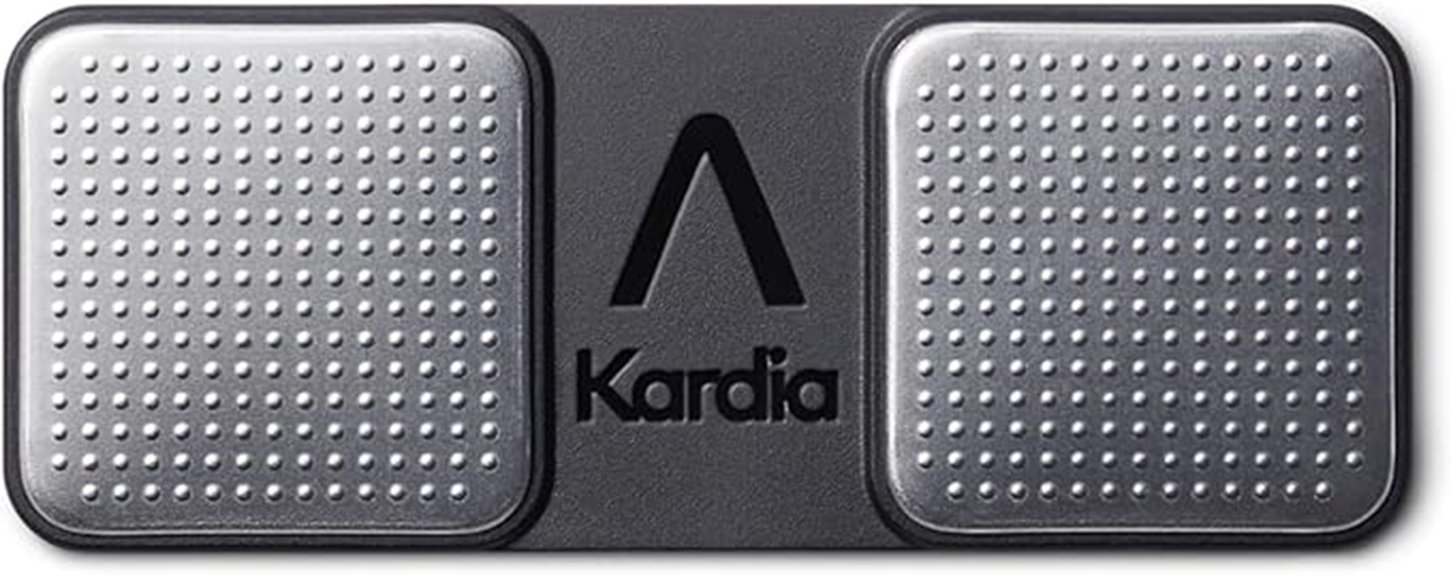
The KardiaMobile 1-Lead Personal EKG Monitor stands out as an excellent choice for individuals seeking a compact, easy-to-use device for regular rhythm monitoring. It records medical-grade EKGs in just 30 seconds and delivers instant analysis through a smartphone app. Compatible with most iOS and Android devices, it’s pocket-sized, requiring no buttons—just connect, place your fingers on the sensors, and follow the simple instructions. While it’s not intended for diagnosing heart attacks or working with pacemakers, it’s highly effective for detecting arrhythmias like AFib. With features like EKG storage and sharing options, it’s a handy tool for proactive heart health management.
Best For: individuals seeking a compact, user-friendly device for regular rhythm monitoring and basic heart health tracking without the need for a full 12-lead EKG.
Pros:
- Easy to use with no buttons; just connect and follow app instructions
- Compact and portable, fitting easily in a pocket or bag
- Reliable for detecting common arrhythmias like AFib with instant analysis
Cons:
- Cannot diagnose heart attacks or provide comprehensive 12-lead EKGs
- Initial setup and review process may cause delays in full functionality
- Not suitable for use with pacemakers or ICDs and limited in detecting ischemia
KardiaMobile 6-Lead Personal EKG Monitor
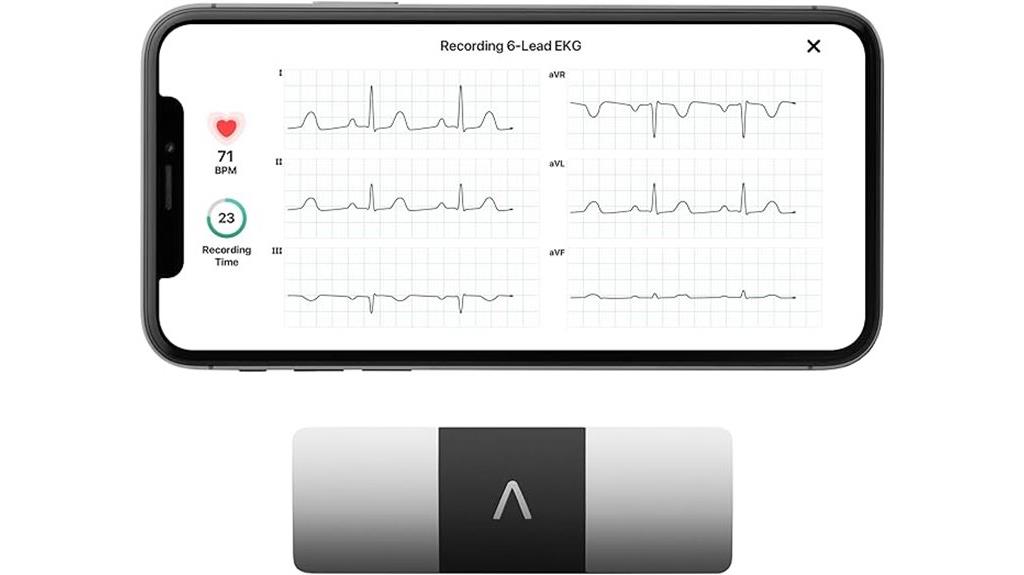
The KardiaMobile 6-Lead Personal EKG Monitor stands out for those seeking medical-grade, detailed heart rhythm data in a portable device. It provides accurate, six-lead ECG recordings in just 30 seconds, enabling detection of AFib, Bradycardia, Tachycardia, and Normal Sinus Rhythm. Many users report its results match hospital 12-lead ECGs. Compatible with most smartphones and tablets via Bluetooth, it’s easy to use with the Kardia app for recording, analyzing, and exporting data. Weighing only 24 grams, it’s ideal for at-home, field, or remote monitoring, offering quick, reliable insights for those with heart concerns or needing continuous tracking.
Best For: individuals seeking a portable, medical-grade six-lead ECG device for at-home or field monitoring of heart rhythm and arrhythmias.
Pros:
- Provides accurate, detailed six-lead ECG recordings comparable to hospital 12-lead results
- Compact, lightweight design weighing only 24 grams for easy portability and use anywhere
- Bluetooth connectivity and user-friendly app for quick recording, analysis, and data export
Cons:
- App may frequently prompt for upgrades or subscriptions, which some users find intrusive
- Regional restrictions may require sideloading the app for Android users in certain areas
- Some users desire additional leads or detachable wires for professional or field use modifications
EMAY 6L Portable ECG Monitor
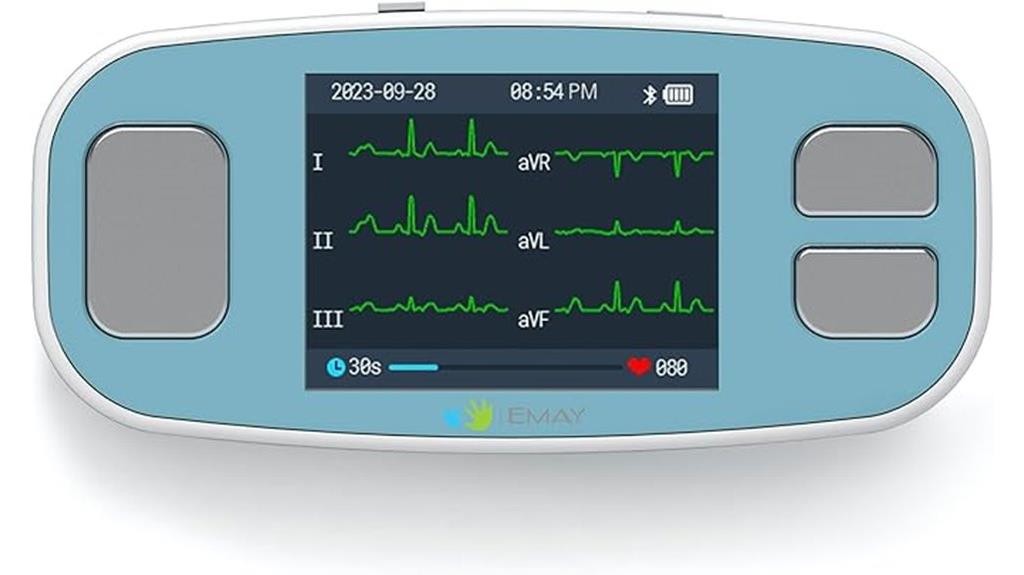
For those seeking an easy-to-use, portable ECG device that doesn’t require a subscription, the EMAY 6L Portable ECG Monitor stands out. It records ECG signals and heart rate in 6 channels, perfect for home health care. Compatible with iOS, Android, Windows, and Mac, it offers seamless data transfer via Bluetooth or USB. Its compact, lightweight design (85 grams) makes it highly portable, and the user-friendly interface simplifies operation. The device supports multiple recordings, detects various heart abnormalities, and displays results on a clear screen. With a 1-year warranty and no ongoing fees, it’s a reliable choice for monitoring your heart health at home.
Best For: individuals seeking an easy-to-use, portable ECG device for home monitoring without ongoing subscription fees, especially those with heart conditions like AFib or tachycardia.
Pros:
- User-friendly, portable design weighing only 85 grams, making it convenient for everyday use.
- Compatible with multiple devices (iOS, Android, Windows, Mac) with seamless Bluetooth and USB connectivity.
- Supports detection of various heart abnormalities and allows storage and review of ECG data for better health management.
Cons:
- Not suitable for use with implanted pacemakers or as a substitute for hospital-grade ECG devices.
- Some users recommend performing multiple tests to ensure accuracy, especially for elderly or mobility-impaired individuals.
- Requires proper placement and adherence to instructions for reliable results; inconsistent use may affect data quality.
KardiaMobile 1-Lead Personal EKG Monitor
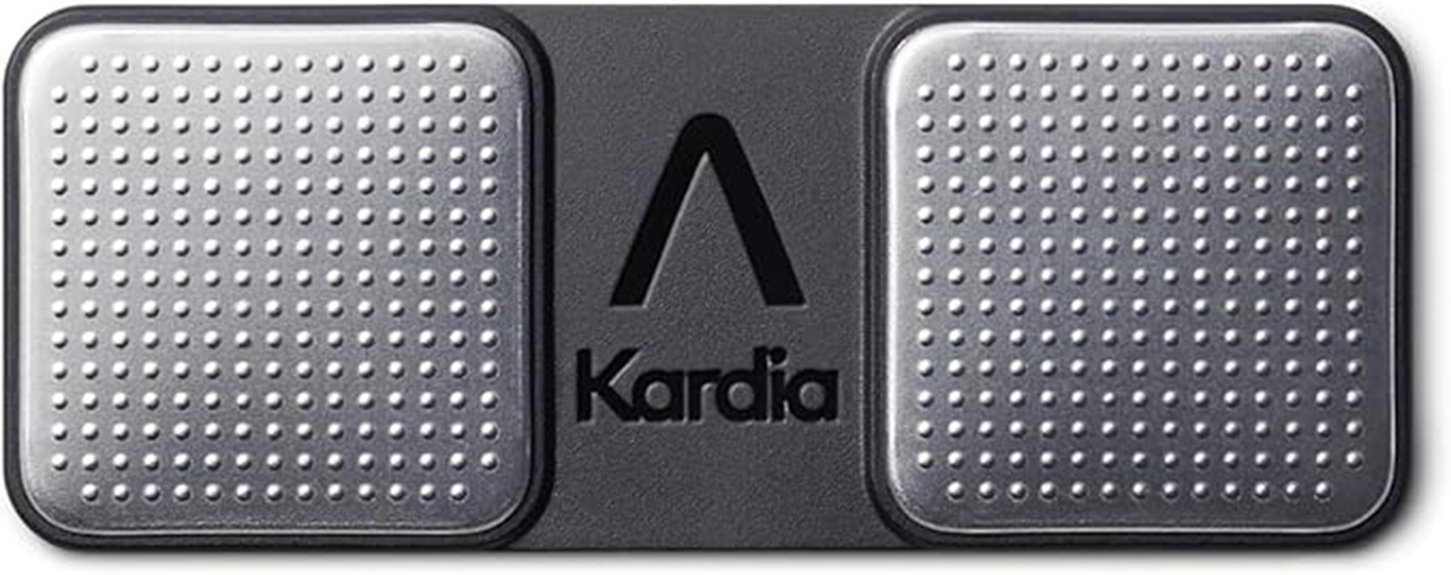
If you’re seeking a compact, easy-to-use device for quick rhythm checks, the KardiaMobile 1-Lead Personal EKG Monitor stands out. It records medical-grade EKGs in just 30 seconds and provides instant analysis through a smartphone app. Compatible with most iOS and Android devices, it’s simple to set up—just remove the plastic, connect to your phone, and follow the app’s instructions. It tracks arrhythmias like AFib and offers features like EKG storage, emailing results, and optional premium services. While not a all-encompassing 12-lead ECG, it’s a reliable tool for rhythm monitoring, helping you stay informed and share data with your doctor easily.
Best For: individuals seeking a portable, easy-to-use device for quick rhythm checks and basic heart monitoring at home or on the go.
Pros:
- Compact, pocket-sized design for convenient use anywhere
- Quick 30-second recordings with instant smartphone analysis
- Compatible with most iOS and Android devices, and offers optional premium features
Cons:
- Does not provide a comprehensive 12-lead ECG or diagnose heart attacks
- Initial setup and review process may delay full access to results
- Not suitable for use with pacemakers or implantable defibrillators and cannot detect all cardiac conditions
EMAY Portable ECG Monitor
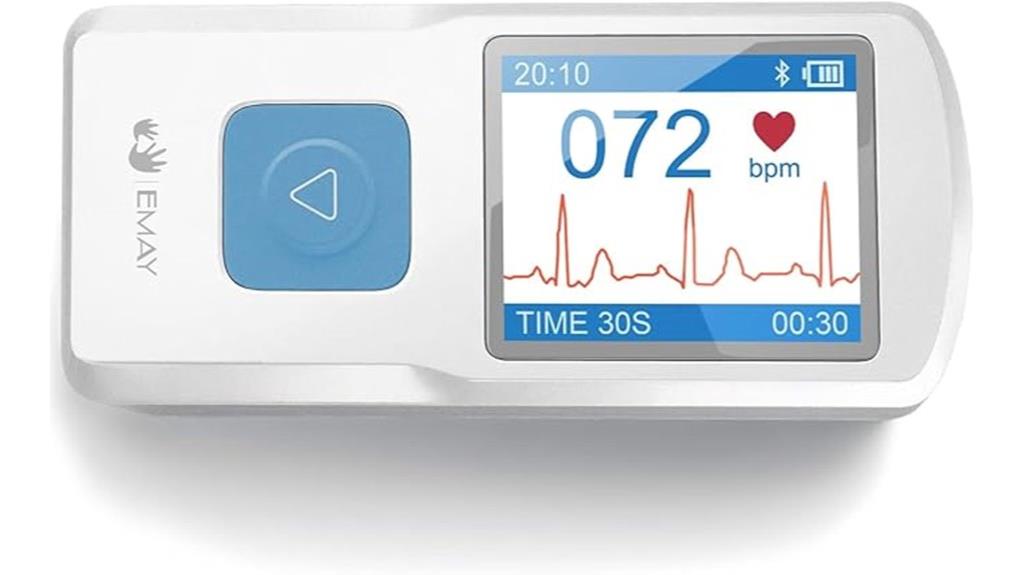
With its compact size, the EMAY Portable ECG Monitor stands out as an ideal choice for individuals seeking dependable, on-the-go heart monitoring. It records and stores Lead I ECG signals, displays real-time heart rate, and generates detailed ECG reports, making it perfect for home use. Compatible with smartphones and PCs via Bluetooth and USB, it’s easy to operate and lightweight at just 80 grams. The device captures 30-second recordings, and users can share results effortlessly via email or printouts. Its rechargeable battery ensures long-lasting use, and many find it accurate and user-friendly, making it a valuable tool for ongoing heart health tracking.
Best For: individuals seeking a portable, easy-to-use ECG device for personal heart monitoring at home or on-the-go.
Pros:
- Compact, lightweight design makes it highly portable and convenient for everyday use
- Compatible with smartphones and PCs via Bluetooth and USB, facilitating easy sharing of reports
- Accurate 30-second ECG recordings with real-time heart rate display and detailed report generation
Cons:
- Some users find the placement instructions could be clearer for optimal readings
- Longer charging cords and modernized ports are suggested for improved usability
- Initial setup or turning on the device may require some practice, especially for non-tech-savvy users
Smart Fitness Tracker with Heart Rate & Blood Oxygen Monitoring
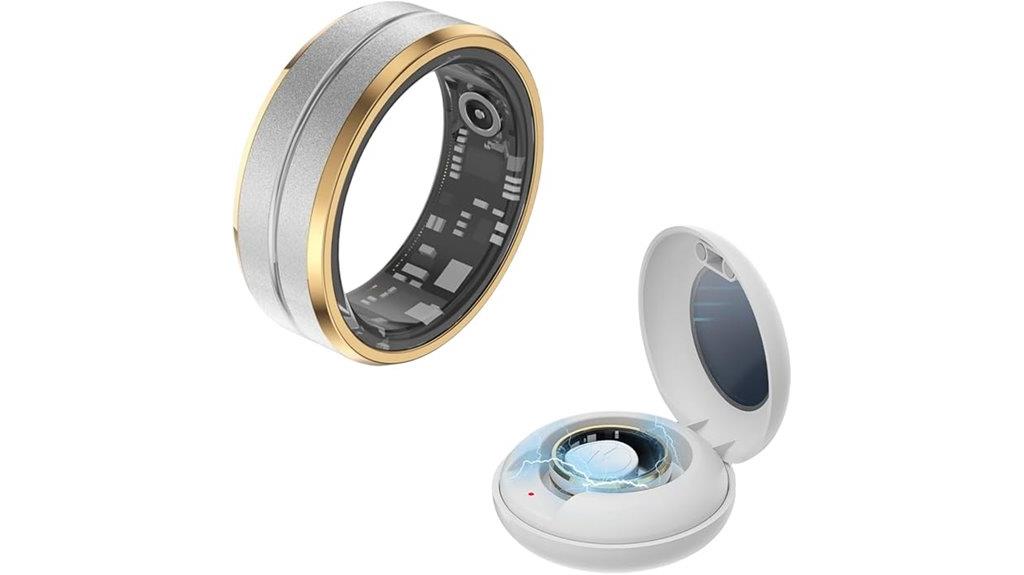
The Smart Fitness Tracker with Heart Rate and Blood Oxygen Monitoring stands out as an ideal choice for active individuals who want seamless health tracking without sacrificing style. This sleek, waterproof device resembles jewelry and comfortably tracks heart rate, blood oxygen levels, sleep, and activity. With support for swimming and water sports, it’s durable and reliable during intense workouts. Its long-lasting battery offers up to 10 days of use, and easy magnetic charging simplifies maintenance. Connecting via WiFi through the app, it provides real-time data and smart notifications. While some users report syncing issues, its stylish design and accurate health metrics make it a compelling, affordable option for daily wellness monitoring.
Best For: active individuals seeking a stylish, waterproof fitness tracker that monitors heart rate, blood oxygen, sleep, and activity without sacrificing fashion or comfort.
Pros:
- Stylish jewelry-like design suitable for daily wear and water activities
- Accurate health and activity tracking, including sleep stages and sports modes
- Long battery life of up to 10 days with easy magnetic charging
Cons:
- Occasional syncing issues and app connectivity problems reported by users
- Software stability and reliability can vary, affecting long-term use
- Limited advanced features compared to higher-end fitness wearables
KardiaMobile 6L Max EKG Monitor with Subscription
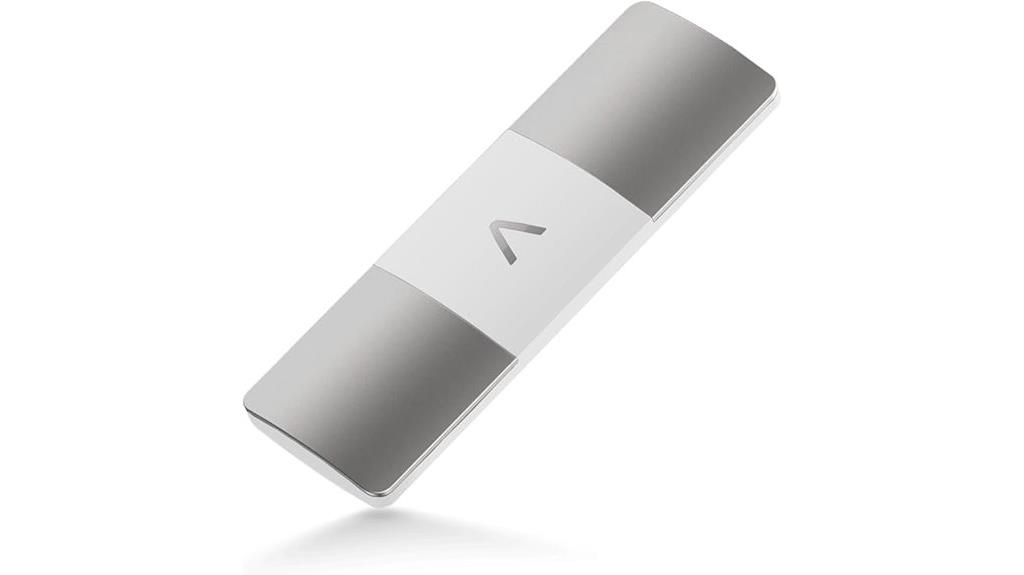
The KardiaMobile 6L Max EKG Monitor with Subscription stands out for its ability to detect six common arrhythmias with medical-grade accuracy, making it ideal for those who need reliable heart monitoring beyond standard smartwatches. It provides instant results within 30 seconds, supports detailed trend analysis, and allows sharing data with healthcare providers. Weighing just 24 grams, it’s portable and compatible with smartphones. The included subscription offers cardiologist reviews, alerts, and personalized insights. While it’s not suitable for pacemakers or ICDs, it’s a trusted tool recommended by cardiologists for tracking irregular rhythms and maintaining heart health between visits.
Best For: individuals who need accurate, portable, and detailed heart rhythm monitoring beyond smartwatch capabilities, especially those with irregular heart rhythms or post-cardiology follow-ups.
Pros:
- Medical-grade accuracy in detecting six common arrhythmias with instant results within 30 seconds
- Supports detailed trend analysis, data sharing, and professional cardiologist reviews through the subscription
- Compact, lightweight design compatible with smartphones for easy use anywhere
Cons:
- Not suitable for use with pacemakers or ICDs
- Some users experience device malfunctions, connectivity issues, or regional compatibility limitations
- Subscription renewal costs $99 after the first year, adding ongoing expenses
OMRON 2-in-1 Blood Pressure and EKG Monitor
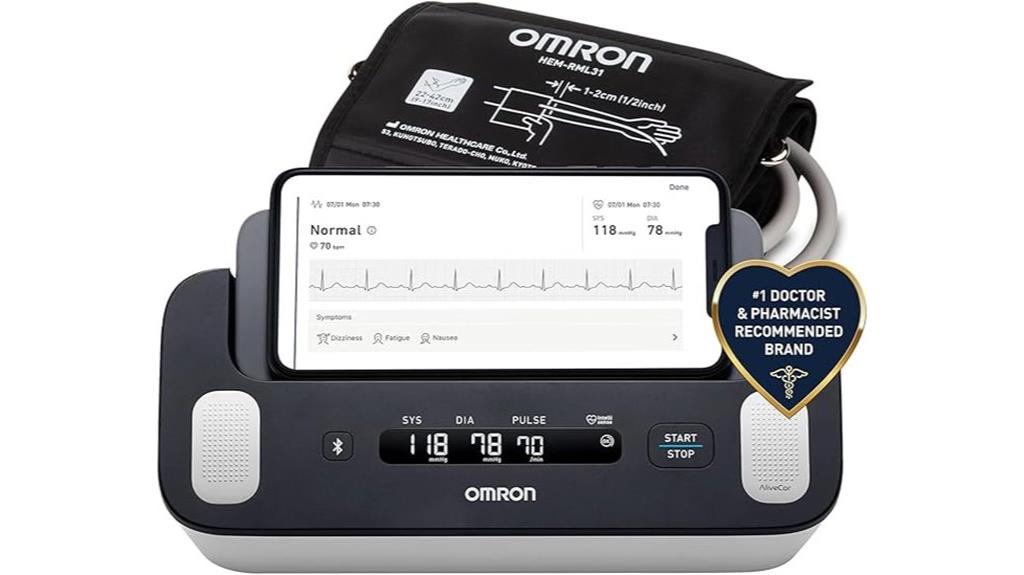
If you’re looking for a device that combines blood pressure monitoring with EKG capabilities, the OMRON 2-in-1 Blood Pressure and EKG Monitor is an excellent choice. It offers clinically validated blood pressure readings alongside single-lead EKG analysis, helping me track heart rhythm and detect AFib, bradycardia, or tachycardia. The device stores up to 90 readings and syncs seamlessly via Bluetooth with the free OMRON Connect app, where I can review trends, share data, and store results. Portable and easy to use with 4 AA batteries, it provides quick feedback and reliable performance—making it a valuable tool for ongoing heart health monitoring at home.
Best For: individuals seeking an easy-to-use, portable device for comprehensive at-home heart health monitoring, including blood pressure and EKG tracking, especially those managing arrhythmias like AFib.
Pros:
- Combines clinically validated blood pressure measurement with single-lead EKG analysis in one compact device
- Supports unlimited data storage via Bluetooth with the free OMRON Connect app for trend tracking and sharing
- Portable and battery-operated with quick, reliable readings suitable for regular home use
Cons:
- Potential variability in blood pressure accuracy (+/- 10 mmHg initially, improved to +/- 5 mmHg after calibration)
- Some users report initial setup challenges and Bluetooth connection stability issues
- Possible hidden costs or subscription requirements for advanced EKG analysis or data sharing features, especially related to AliveCor services
KardiaMobile Card Personal EKG Device
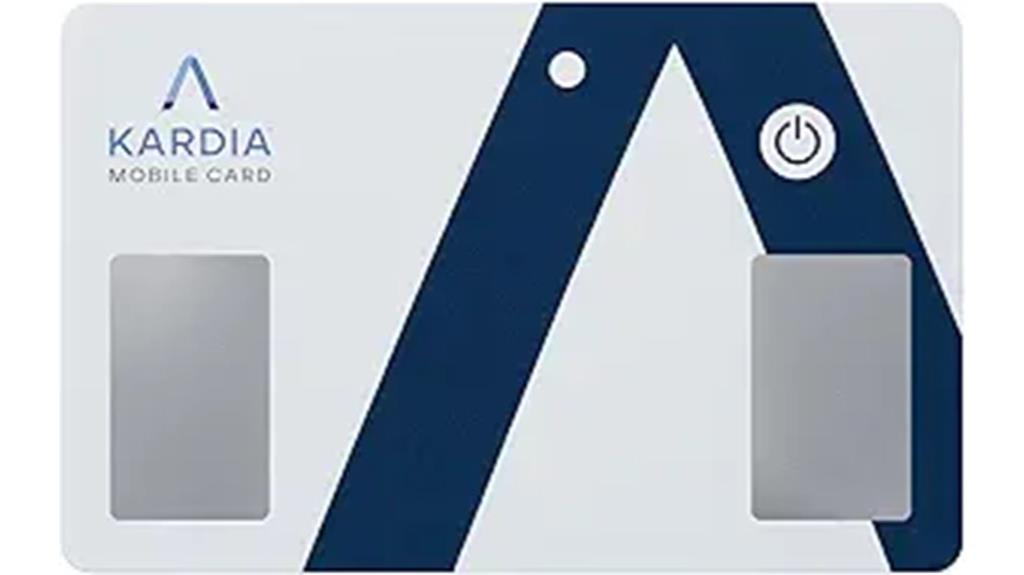
For anyone seeking a highly portable, easy-to-use ECG device that fits seamlessly into daily life, the KardiaMobile Card is an excellent choice. This wallet-sized device weighs just 7.4 grams and measures about 3.37 x 2.13 inches, making it incredibly convenient to carry everywhere. It connects via Bluetooth to most smartphones and tablets, requiring no WiFi. With a two-year battery life and straightforward operation—just place your fingers on the sensors—it delivers medical-grade single-lead ECGs in seconds. FDA-cleared and doctor-recommended, it’s perfect for detecting arrhythmias like AFib, offering reliable, instant results on the go.
Best For: individuals seeking a highly portable, easy-to-use personal ECG device for on-the-go heart rhythm monitoring, especially those managing arrhythmias like AFib.
Pros:
- Ultra-compact, lightweight design fits easily into a wallet for convenience.
- Simple, quick operation with instant, medical-grade ECG results without needing WiFi.
- Long battery life of approximately two years with reliable Bluetooth connectivity to smartphones and tablets.
Cons:
- Limited compatibility and support outside the USA and Canada, which can hinder use for some users.
- Does not measure blood pressure or provide comprehensive rhythm analysis, limiting diagnostic scope.
- Possible issues with device support, app availability, and artifacts affecting accuracy if not used carefully.
Portable EKG & Heart Rate Monitor with LCD Screen & Storage
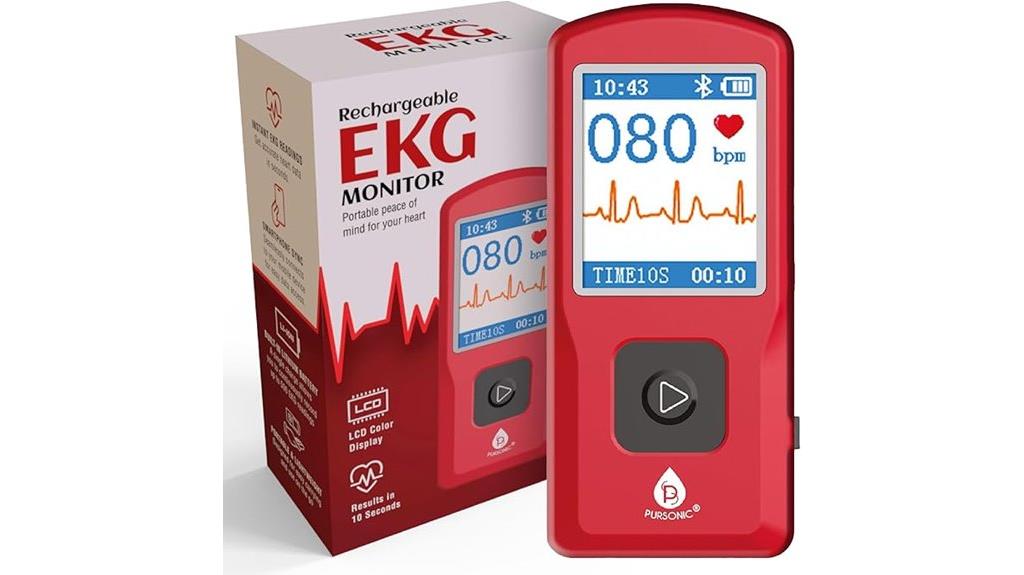
A portable EKG and heart rate monitor with an LCD screen and built-in storage is an excellent choice for individuals who want quick, reliable heart health tracking without relying on smartphones or subscriptions. Compact and standalone, it supports multiple recording positions—Hand-to-Hand, Hand-to-Chest, and Hand-to-Leg—for extensive monitoring. It records 30-second ECGs and heart rates effortlessly, displaying results clearly on the color LCD screen. With space for up to 100 readings, you can store data locally and sync it later for review or sharing with your healthcare provider. Its user-friendly design makes regular heart monitoring simple and accessible, anytime you need.
Best For: individuals seeking a portable, easy-to-use heart monitoring device that provides quick ECG and heart rate readings without the need for smartphones or subscriptions.
Pros:
- Compact, standalone design ideal for home use and on-the-go monitoring
- Supports multiple recording positions for comprehensive heart health tracking
- Stores up to 100 readings locally and allows easy syncing with apps and PCs for detailed review
Cons:
- Not suitable for users with pacemakers or ICDs due to safety concerns
- 30-second recording time may not capture longer or more complex heart events
- Requires manual syncing with an app or PC for detailed data analysis
EMAY 6L Portable ECG Monitor with Heart Rate Recording

The EMAY 6L Portable ECG Monitor stands out as an ideal choice for individuals seeking reliable, at-home heart monitoring without the hassle of subscriptions. It records ECG signals and heart rate in 6 channels, making it versatile for daily health checks. Compatible with iOS, Android, Windows, and Mac, it connects via USB or Bluetooth, offering easy data transfer. With a compact, lightweight design and a user-friendly interface, I find it simple to operate. Its ability to detect arrhythmias like AFib, tachycardia, and PVC makes it a valuable tool for ongoing heart health management. Plus, the device’s affordability and no ongoing fees make it accessible for regular use.
Best For: individuals seeking a reliable, portable ECG device for at-home heart monitoring without ongoing subscription fees, especially those with arrhythmias or heart health concerns.
Pros:
- Easy to operate with a user-friendly interface and compatible with smartphones and PCs for seamless data transfer.
- Accurate detection of various heart abnormalities such as AFib, tachycardia, and PVC, aiding early diagnosis and ongoing monitoring.
- Compact, lightweight design with no subscription fees, making it convenient and economical for regular use.
Cons:
- Not suitable for implanted pacemakers or as a substitute for hospital-grade ECG devices.
- Some users suggest alternative placement methods for elderly or mobility-challenged patients to improve accuracy.
- Requires regular manual data logging and review, which may be time-consuming for some users.
EKG Monitor, Portable Heart Rate Monitor with LCD Screen and Storage
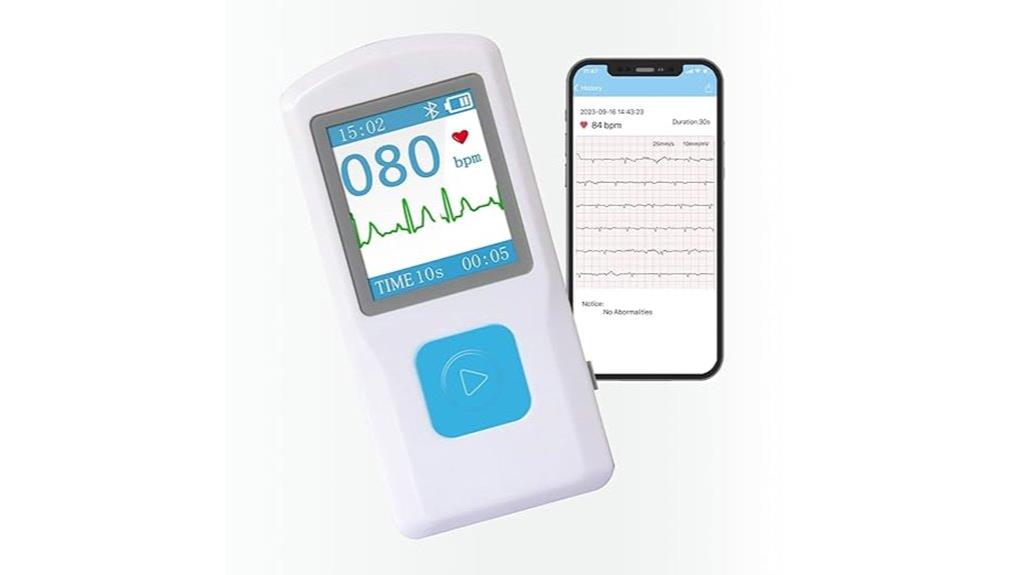
If you need a portable ECG device that delivers quick, professional-grade results, this heart rate monitor with an LCD screen and storage is an excellent choice. It records accurate ECG data in just 30 seconds and offers multiple monitoring modes—Hand to Hand, Hand to Chest, and Hand to Leg—for all-encompassing assessment. Weighing only 60g, it’s lightweight and perfect for on-the-go use. The device easily connects to smartphones and computers via Bluetooth or cable, making data sharing simple. Its intuitive operation and sturdy design make it user-friendly, especially for those managing heart conditions like AFIB or CHF. Overall, it’s a reliable, portable solution for personal heart monitoring.
Best For: individuals seeking a portable, easy-to-use ECG device for personal heart monitoring, especially those with conditions like AFIB or CHF.
Pros:
- Provides quick, professional-grade ECG results within 30 seconds.
- Compact and lightweight design (only 60g), ideal for on-the-go use.
- Easy data transfer via Bluetooth or cable, compatible with smartphones and computers.
Cons:
- Limited to a single-lead ECG, which may restrict comprehensive diagnostics.
- Compatibility issues reported with some iOS devices; recent updates may help.
- Some users and professionals find the device’s functionality insufficient for advanced or professional medical analysis.
Beurer Cardio Companion EKG Monitor
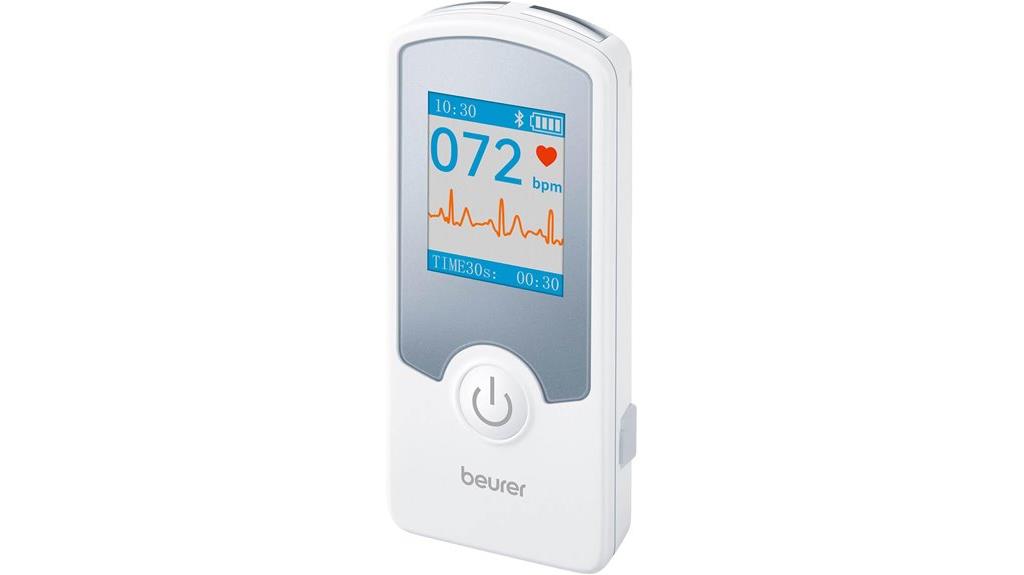
For those seeking a portable and easy-to-use ECG device, the Beurer Cardio Companion EKG Monitor (ME75) stands out with its compact design and quick, reliable readings. Made in Germany, it features a rechargeable USB battery, a bright color display, and Bluetooth for seamless data transfer. It offers four measurement options—hand-to-hand, finger-to-chest, finger-to-finger, or finger-to-wrist—though hand-to-hand is recommended for accuracy. Results are available in under 30 seconds, and the device is FDA-cleared to detect irregular heart rhythms and arrhythmias. With storage for 100 readings and app integration, it’s perfect for convenient, at-home heart monitoring.
Best For: individuals seeking a portable, user-friendly ECG device for reliable at-home heart rhythm monitoring and trend tracking.
Pros:
- Compact design with bright color display and Bluetooth connectivity for easy data transfer.
- Quick results in under 30 seconds with FDA-cleared accuracy for detecting irregular rhythms and arrhythmias.
- Stores up to 100 readings locally and supports unlimited measurements via app for comprehensive health tracking.
Cons:
- Not suitable for users with pacemakers, metal implants, or other electrical devices.
- Requires smartphone or Bluetooth-enabled device for unlimited data storage and advanced features.
- Hand-to-hand measurement recommended, so skin-to-skin contact should be avoided for optimal accuracy.
Case for KardiaMobile 1L/6L Personal EKG Monitor

A hard EVA shell case offers exceptional protection for the KardiaMobile 1L/6L Personal EKG Monitor, making it an ideal choice for users who prioritize device safety during travel or daily activities. Its shockproof, dustproof, and waterproof design guards against drops, scratches, and splashes. The compact, lightweight build (about 10 grams) makes it easy to carry everywhere. It features a built-in pill box with two compartments, perfect for emergency medications, and a sturdy carabiner clip to attach to bags or belts. Made from durable EVA material, this case guarantees your monitor stays safe, organized, and ready for accurate heart monitoring anytime you need it.
Best For: individuals seeking a durable, portable case to protect their KardiaMobile 1L/6L EKG monitor during travel, daily use, or emergencies.
Pros:
- Provides excellent shockproof, dustproof, and waterproof protection for the device
- Compact and lightweight design enhances portability for on-the-go use
- Includes a built-in pill box and sturdy carabiner clip for added convenience and organization
Cons:
- Does not include the KardiaMobile device itself, only the case and accessories
- Limited color or design options (if any) may not suit personal aesthetic preferences
- Small size may make it easy to misplace or lose if not attached securely
Factors to Consider When Choosing Connected ECG Devices
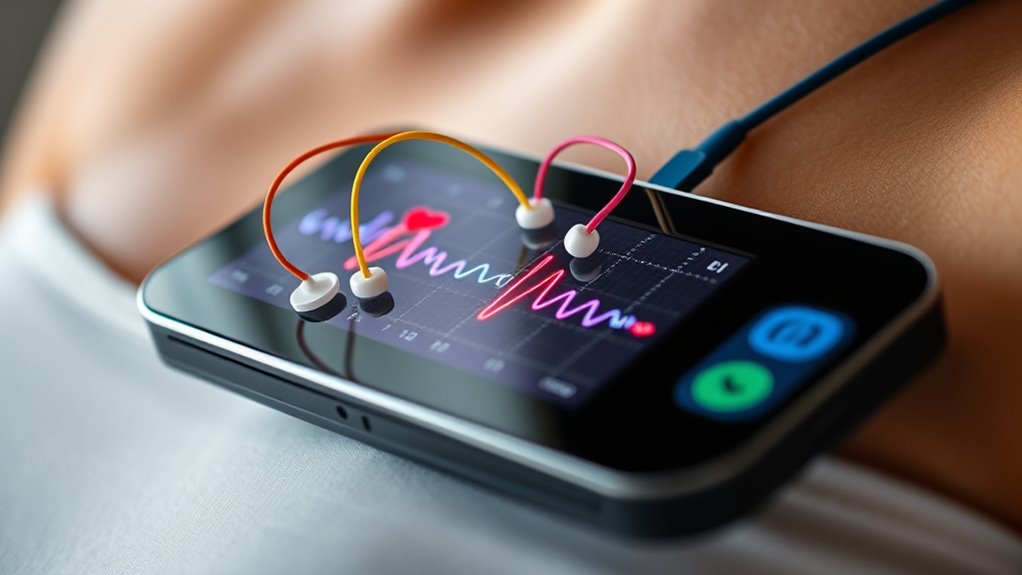
When selecting a connected ECG device, I focus on compatibility with my existing gadgets, ensuring seamless integration. I also prioritize accuracy, reliability, and easy data sharing to keep my health information secure and accessible. Finally, I look for user-friendly app features that make monitoring simple and effective.
Compatibility With Devices
Choosing a connected ECG device starts with guaranteeing it works smoothly with your existing devices. First, check that it’s compatible with your smartphone or tablet’s operating system, whether iOS or Android, to avoid connectivity issues. Next, see if the device supports Bluetooth, USB, or Wi-Fi, depending on how you prefer to transfer and sync data. It’s also important to verify that it integrates seamlessly with your health apps or platforms for extensive tracking. Regional availability matters too; some devices or apps may have restrictions outside specific countries or require sideloading. Lastly, review the device specs to confirm compatibility with your hardware features like screen size or accessory ports, so you get the best performance and user experience.
Accuracy and Reliability
Ensuring your connected ECG device delivers accurate and reliable readings is essential for effective health monitoring. The accuracy depends on the device’s ability to produce consistent, high-quality signals that align with clinical standards, such as FDA approval and validation studies. Reliability means the device can provide precise readings over time without frequent calibration or malfunctions, making long-term monitoring trustworthy. Proper sensor placement, correct user technique, and thoughtful device design greatly influence ECG accuracy. Devices equipped with advanced signal processing, noise reduction, and artifact filtering tend to deliver more dependable data. Regularly testing your device against professional medical equipment helps verify its accuracy. Prioritizing these factors ensures your ECG device offers dependable results, giving you confidence in your heart health insights.
Data Sharing Options
Selecting a connected ECG device involves considering its data sharing options, which are essential for effective remote monitoring and medical review. Many devices support sharing data via email, cloud storage, or direct app-to-provider transfer, making it easier to keep healthcare professionals updated. Export options like PDFs or images simplify sharing ECG reports for analysis. Some devices even integrate with electronic health record systems, allowing seamless data storage within medical databases. Real-time alerts or notifications can notify providers immediately if abnormal readings are detected. However, privacy and security are critical—look for encryption, user consent features, and secure data transfer protocols to protect sensitive health information. Choosing a device with flexible, secure sharing options ensures more efficient management of your heart health.
Ease of Use
When it comes to using a connected ECG device effectively, ease of use plays a key role in making the process smooth and stress-free. An intuitive interface with clear instructions and minimal setup steps helps users get started quickly without frustration. Devices that offer real-time guidance during measurements ensure accuracy and reduce errors. Compatibility with popular smartphones and tablets makes operation straightforward, so you don’t need specialized training. Features like automatic data syncing, simple report sharing, and easy navigation improve overall experience. Additionally, lightweight and portable designs, along with minimal physical interaction requirements, make these devices accessible—even for users with limited dexterity or mobility challenges. Prioritizing ease of use guarantees you can monitor your heart health confidently and effortlessly.
App Functionality
A user-friendly app interface is crucial for making connected ECG devices easy to operate and understand. The best apps simplify recording, reviewing, and sharing ECG data, so I can focus on my health without hassle. They offer detailed analysis, including rhythm interpretation and trend tracking, which helps me monitor changes over time. Compatibility with both iOS and Android ensures I can use the device regardless of my phone. Features like customizable notifications keep me informed, while data export options allow me to share results with my healthcare provider easily. Seamless integration with other health apps adds convenience. Regular app updates and reliable customer support are essential—they keep the system secure, fix bugs quickly, and enhance functionality, giving me confidence in my device’s ongoing performance.
Cost and Subscription
Considering the costs and subscription fees associated with connected ECG devices is essential to guarantee you choose a model that fits your budget and meets your needs. Many devices offer free basic ECG recording and sharing, but accessing advanced features like detailed analysis, trend tracking, or cardiologist review often requires a subscription. These fees can range from about $10 to over $100 annually, on top of the device’s initial price, which varies widely—from around $100 to $200. Some models include the subscription cost in their upfront price or offer free trials, but recurring charges are common for continuous access to premium services. I recommend weighing whether the subscription’s value justifies the expense based on the features you need for effective heart monitoring.
Frequently Asked Questions
How Do Connected ECG Devices Compare in Long-Term Cost and Subscription Fees?
When comparing connected ECG devices, I find that long-term costs vary mainly due to subscription fees. Some devices have a one-time purchase, saving money over time, while others require ongoing subscriptions for data storage and analysis. I recommend carefully evaluating these fees upfront, considering your needs. For me, devices with lower or no subscription fees proved more cost-effective in the long run, ensuring reliable monitoring without extra expenses.
Are These Devices Suitable for Individuals With Implantable Cardiac Devices?
You’re wondering if connected ECG devices suit individuals with implantable cardiac devices. I’d advise caution, as these devices may interfere with or be affected by implants. It’s best to consult your cardiologist before using them. They can recommend compatible options and ensure your safety. While some devices are designed with compatibility in mind, professional medical advice is crucial to avoiding risks and getting accurate readings.
Can Connected ECG Monitors Detect All Types of Irregular Heart Rhythms?
When it comes to detecting irregular heart rhythms, I’d say connected ECG monitors are quite helpful but not perfect. They can catch many common issues like atrial fibrillation, but some rarer or subtle irregularities might slip by. I always recommend consulting with a healthcare professional for a thorough assessment. These devices are valuable tools, yet they’re best used alongside expert advice for a complete picture of your heart health.
How Do Device Accuracy and Reliability Vary Across Different Brands?
When it comes to device accuracy and reliability, I’ve noticed significant differences among brands. Some have proven more consistent in detecting irregular rhythms, thanks to advanced sensors and algorithms. I always recommend checking user reviews and clinical validations, as these give better insights into performance. While no device is perfect, selecting reputable brands with proven track records helps guarantee you get reliable heart monitoring.
What Are the Privacy and Data Security Measures for Stored ECG Data?
When it comes to privacy and data security for stored ECG data, I prioritize devices that use robust encryption and secure cloud storage. I look for features like two-factor authentication and local data storage options to prevent unauthorized access. Manufacturers that are transparent about their security protocols give me confidence. Protecting sensitive health information is vital, so I choose devices that comply with privacy regulations like HIPAA and GDPR.
Conclusion
Choosing the right connected ECG device really comes down to your specific needs. I remember a friend who started using the KardiaMobile 6-Lead and felt reassured knowing her heart was closely monitored, especially during her busy schedule. Whether you prefer a single-lead or six-lead device, there’s something out there that can give you peace of mind. Trust me, finding the right monitor can make all the difference in staying proactive about your heart health.

